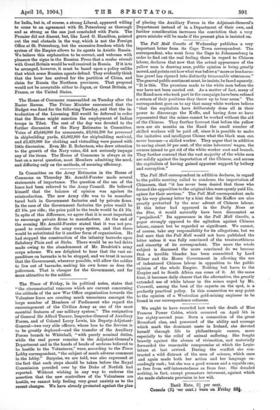The Times of Friday, in its political notes, states that
"the circumstantial rumours which are current concerning the attitude of the new War Office organisation towards the Volunteer force are creating much uneasiness amongst the large number of Members of Parliament who regard the encouragement of the Civilian Army as one of the most essential features of our military system." The resignation of General Sir Alfred Turner, Inspector-General of Auxiliary Forces, and of Colonel Leroy Lewis, his Deputy-Adjutant- General—two very able officers, whom loss to the Service is to be greatly deplored—and the transfer of the Auxiliary Forces branch to Whitehall, "with purely nominal duties, while the real power remains in the Adjutant-General's Department and in the hands of heads of sections believed to be hostile to the Volunteers," were, according to the Times Lobby correspondent, "the subject of much adverse comment in the lobby." Surprise, we are told, was also expressed at the fact that such steps should be taken before the Royal Commission presided over by the Duke of Norfolk had reported. Without wishing in any way to endorse the assertion that the new controllers of the Volunteers are hostile, we cannot help feeling very great anxiety as to the recent changes. We have already protested against the plan
We ought to have recorded last week the death of Miss Frances Power Cobbe, which occurred on April 5th in her eighty-second year. Born a connection of the great Beresford clan, and possessed of the ability and courage which mark the dominant caste in Ireland, she devoted herself through life to philanthropic causes, more especially to the relief of animal suffering. She fought bravely against the abuses of vivisection, and materially forwarded the reasonable compromise at which the Legis- lature at last arrived. During the conflict she con- tracted a wild distrust of the men of science, which once and again made both her action and her language ex- ceedingly rash ; but she was a good woman and a capable one, as free from self-interestedness as from fear. She dreaded nothing, in fact, except premature interment, against which she made elaborate provision in her will.






































 Previous page
Previous page